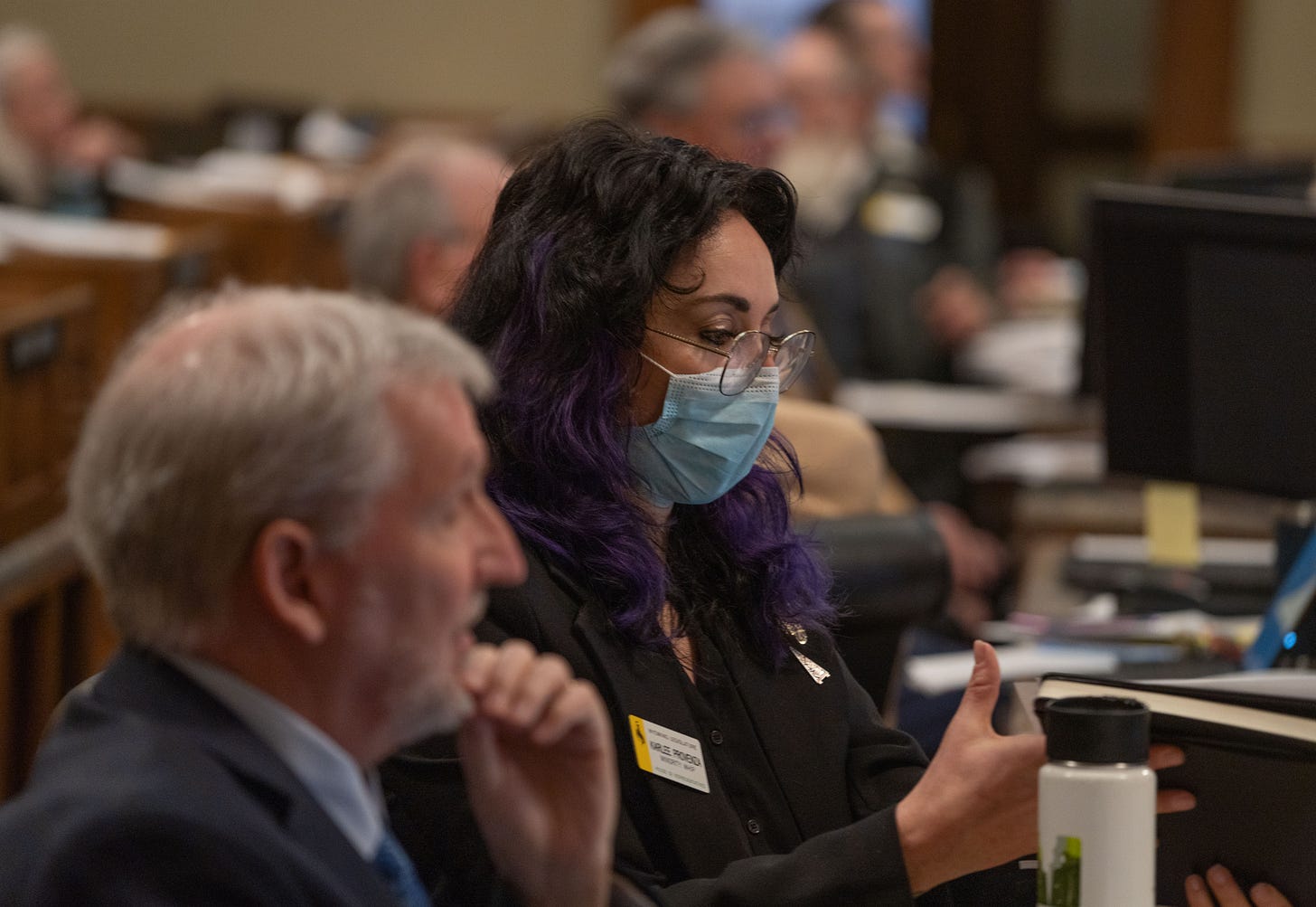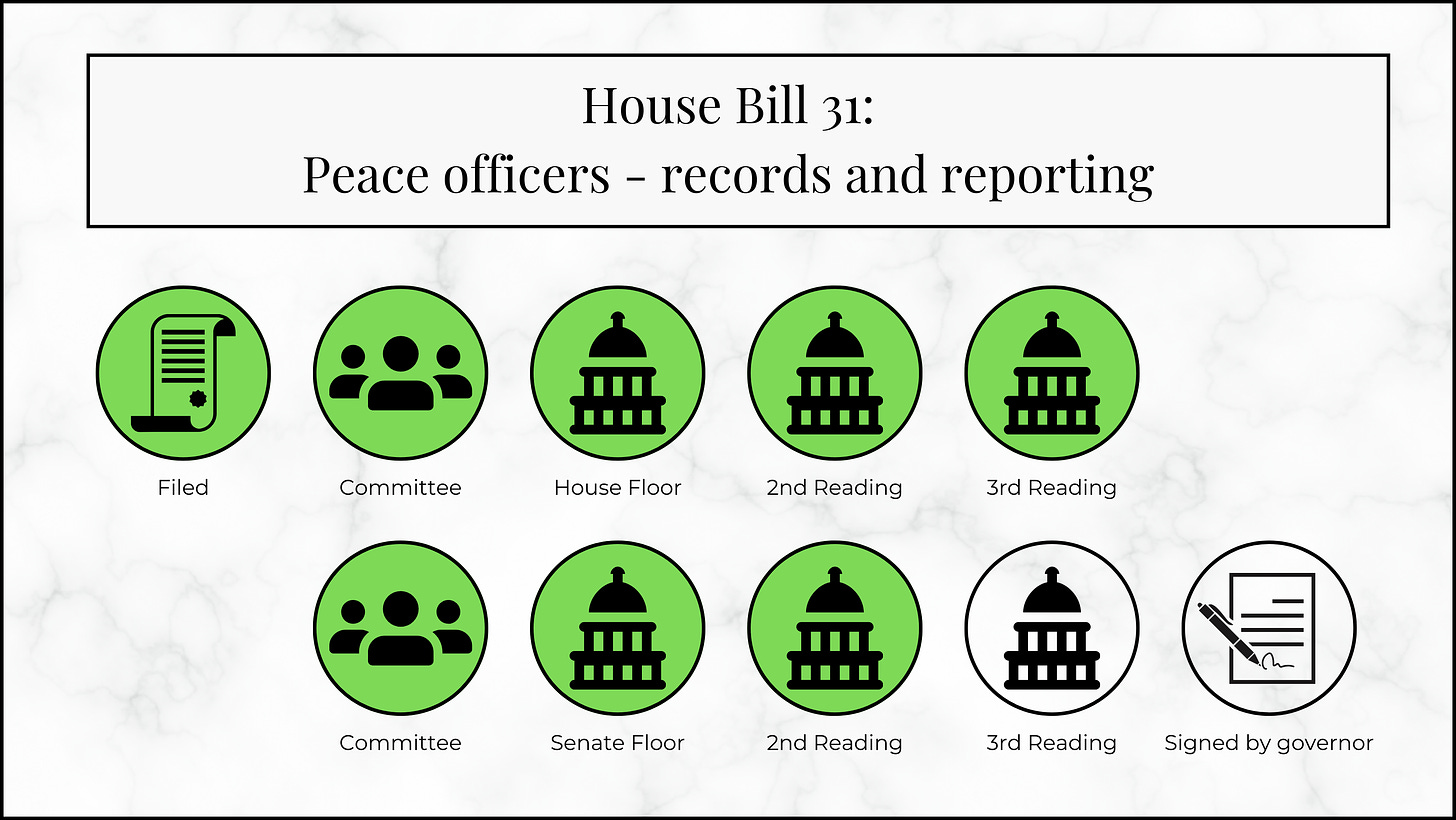Senate committee advances police oversight bill
As Highway Patrol leaders objected to the scope of documents being made available to its certifying agency, Rep. Provenza argued police “have the legal right to kill you” and deserve greater scrutiny.

A bill clarifying that the state’s main police oversight agency can access personnel records has once again advanced with a unanimous vote from lawmakers.
House Bill 31 would give the Peace Officer Standards and Training (POST) Commission access to the records it needs to determine whether certain individuals are deserving of the badge. Albany County Rep. Karlee Provenza (HD-45) has championed the bill since its inception, saying it was inspired by events in her local community.
In 2018, then-Albany County Sheriff’s Deputy Derek Colling shot and killed an unarmed man in Laramie, sparking a fierce fight for greater police transparency and accountability. Colling was never criminally charged, but the sheriff who hired him resigned in disgrace, followed by the county attorney who had decided not to bring charges. Colling himself was forced out by the next sheriff and the county eventually paid more than $1 million to the dead man’s family.
But Colling was never decertified — meaning he could, in theory, take up another job in law enforcement elsewhere. Attempts to investigate him for possible decertification stalled out in Albany County District Court, where the judge decided that POST did not have a clear legal right to view Colling’s personnel records.
“The dire thing that has happened because of that Albany County ruling is now … it has a chilling effect on agencies,” Provenza told lawmakers Wednesday. “Why would you hand over records if now the courts have said it’s illegal to do so? So they risk potential litigation — and I know that was the concern of the sheriff of Albany County.”
If POST can’t access the records it needs to evaluate officers, Provenza said local communities will have no reason to trust their police.
“My community no longer trusted law enforcement until there were major changes in who the sheriff was; people were afraid to be pulled over,” Provenza said. “If we want to protect the sanctity of — the legitimacy of — law enforcement, we have to allow for an accountability mechanism.”
The bill advanced out of committee with a 5-0 vote, passing a committee of the whole vote on the Senate floor later that day and its second reading the next day. It will require one more reading in the Senate before it can be sent to the governor for his signature.
The problem
POST is tasked by the state with certifying new officers, deputies and correctional officers — and decertifying those accused of crimes or other misconduct.
But the commission has been halted from carrying out investigations — including its investigation into Derek Colling — by specific language in state statute that appears to block it from accessing the personnel records of individual officers or deputies.
The Wyoming Public Records Act forbids the disclosure of government employee personnel records to the public. It specifically restricts access to those personnel records to the employee’s supervisor. For a city police officer, that would be the chief of police. For a sheriff’s deputy, that would be the sheriff.
POST, however, is not a supervisor. It’s an independent state commission.
So law enforcement agencies, fearful of the litigation that might follow if they share personnel records they’re not allowed to, have rejected requests from POST. And the courts have backed them up.
The bill clears up this apparent discrepancy between what POST is tasked with doing and what it’s allowed to do. It specifically grants the commission access to personnel records related to its investigations.
Wyoming Highway Patrol looks to scale back the bill
The bill has been endorsed by advocates of police accountability, the POST Commission director, the sheriff of Albany County and every lawmaker who’s had the chance to cast their vote.
But it’s also received some pushback from law enforcement leaders who say they’re concerned about the range of documents this bill will open up to POST. Specifically, Wyoming Highway Patrol leaders said they were worried about the level of oversight the legislation would enable.
“We are not opposed to this — in fact, we applaud good policing, hiring good police officers and holding them accountable,” WHP Administrator Tim Cameron said during a House Judiciary Committee hearing last week. “Our only concern is: does this open the door and create a new entity that would, on its own volition, investigate what may be gauged as not-appropriate discipline, or resolving a citizen complaint?”
Under the bill, POST would gain access to the records relevant to its mission of certifying and decertifying officers. These include records about citizenship status, criminal history and education — and Wyoming Highway Patrol has no problem with POST accessing these. But POST also needs to assess whether potential or current officers maintain a “good moral character” and whether they are physically, mentally and emotionally fit to serve as a peace officer.
And WHP Lt. Colonel Josh Walther said that is a step too far.
To be clear, POST is already required by state law to evaluate these qualifications — they are explicitly enumerated in the existing state statute that gives POST its mandate — and the new bill would simply let POST access the records it needs to conduct that evaluation.
But Walther argued giving POST this access would put Wyoming on a slippery slope.
“To us, that opens the door to really anything somewhat subjective when we determine what is in the background investigation,” he said. “So when we’re turning over documentation, if requested, to prove that they’re of good moral character or not — that’s really opening the door to all their personnel records or their entire background investigation.”
After WHP’s complaints during the committee hearing — and during the bill’s second reading on the House floor — representatives passed an amendment clarifying that POST could only access a record if it “is specifically related to a complaint.”
‘The legal right to kill you’
The amended bill advanced out of the House with a unanimous vote and appeared before the Senate Judiciary Committee Wednesday.
Once again, Wyoming Highway Patrol leaders attempted to scale back the bill, suggesting an amendment to limit the documents explicitly available to POST.
Administrator Cameron repeated that he was worried the bill would “open the door” to wider investigations.
“We support good policing, accountability in our police officers, and we commend the work done by Director [Chris] Walsh and the POST Commission,” he said. “I just have a couple concerns about the bill and anything that’s titled ‘personnel records’ obviously.”
Provenza rejected this concern, reiterating that the bill only gives POST access to the records it needs to do the job it’s been doing since the 1970s. She said any investigation, before it can result in discipline, must go before the state’s Office of Administrative Hearings — so there’s no opportunity for a “witch hunt.”
Provenza added that she understands concerns about privacy, but police officers enjoy greater protections than others in the criminal justice system.
“If you’re an attorney, you have to answer to the Wyoming State Bar if you engage in some sort of misconduct,” she said. “They can pull your text messages, your bank records, anything that they need. And I would submit to you, committee, [lawyers] don’t have the legal right to kill you. So I don’t think that we’re asking too much to allow the certifying agency to ask for these records.”
The committee passed the bill on a unanimous 5-0 vote. At time of press, the bill had passed its second reading on the Senate floor.




